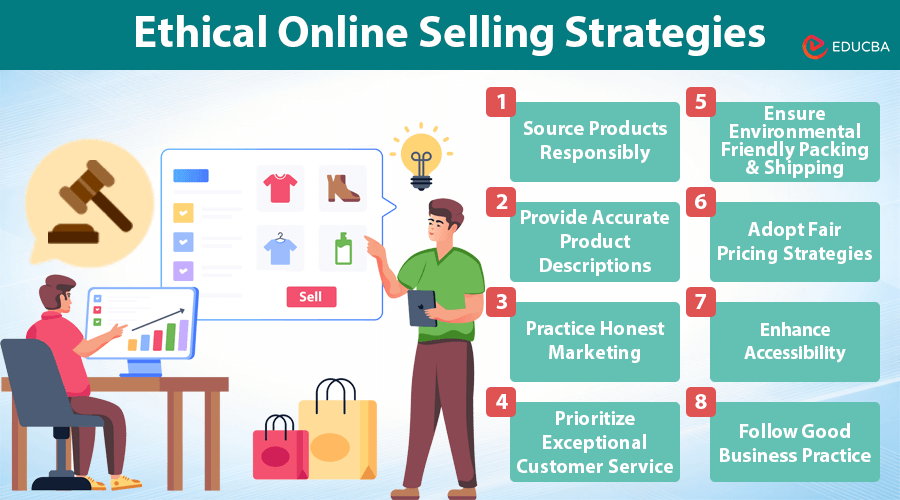Introduction to Ethical Online Selling Strategies
Selling products online ethically is essential for building a sustainable and trustworthy e-commerce business. Nowadays, consumers are highly aware of the ethical values behind their purchases, making it important for online sellers to focus on responsible practices. Adhering to ethical standards ensures that businesses operate with integrity, which helps build a positive reputation and strong customer relationships. In this article, we will look at some of the ethical online selling strategies that meet ethical standards and earn long-term trust from their customers.
What are the Ethical Online Selling Strategies?
Here are some key ethical online selling strategies:
#1. Source Products Responsibly
An important part of ethical online selling is responsibly sourcing products. This means choosing suppliers and manufacturers who ensure safe working conditions, offer fair wages, and follow fair labor practices. Sellers should deeply understand their supply chain and ask questions about production processes, working conditions, and environmental impact.
Whenever possible, partner with suppliers certified by Fair Trade, B Corp, or those who meet industry standards. This ensures ethical sourcing of products and appeals to consumers who value social responsibility.
#2. Provide Accurate Product Descriptions
An ethical online seller should always provide accurate and honest product descriptions. This includes being fully transparent about the materials used, the product’s manufacturing process, and any limitations or drawbacks.
Sellers should not exaggerate or misrepresent what the product can do. It is important to set realistic expectations for customers. Honesty also applies to pricing—no hidden fees or unexpected charges should exist. Ethical sellers clear all costs upfront so customers know what to expect.
#3. Practice Honest Marketing
Ethical online sellers should practice honest, responsible, and truthful marketing. This means avoiding tactics like creating false urgency or using misleading images and instead focusing on their products’ real qualities and benefits.
Sellers should also be mindful of their target audience, ensuring they do not exploit vulnerable groups or promote harmful products. Additionally, respecting customer privacy is crucial to obtaining proper consent for data collection and following data protection regulations.
#4. Prioritize Exceptional Customer Service
Customer service is another crucial area where ethics matter. It involves how a business interacts with customers, resolves their issues, and addresses complaints with care and empathy. Ethical sellers should create clear and fair return and refund policies that fulfill the promises made about their products without causing unnecessary complications.
If there are mistakes with a product or other issues, sellers should ensure that a proper solution is provided, including compensation if needed. By maintaining open communication and meeting customer needs, sellers can build strong relationships and foster brand loyalty.
#5. Ensure Environmental Friendly Packing and Shipping
Environmental responsibility is crucial for ethical online selling, and packing and shipping play a significant role. Sellers can focus on several aspects, such as using eco-friendly packaging materials and optimizing shipping routes to reduce carbon emissions.
They may also offer carbon-neutral shipping options. Additionally, sellers should consider the environmental impact of their products by providing greener alternatives or instructions for recycling and disposal after use. Some ethical sellers even participate in environmental initiatives or donate profits to support environmental causes.
#6. Adopt Fair Pricing Strategies
Pricing is another important ethical issue in online selling. While it is normal for businesses to aim for profitability, sellers should focus on fair pricing that reflects the true value of the product and the costs of ethical sourcing and production.
This does not mean selling at rock-bottom prices but finding a balance supporting sustainable business practices while delivering value to customers. Sellers should be fully open about pricing and avoid raising prices unfairly during high demand or limited supply.
#7. Enhance Accessibility
One aspect that many ethical online sellers often neglect is accessibility. This refers to how easily people with disabilities, including individuals who rely on assistive technologies, can use your online store. To enhance your website’s accessibility, add alt text for images, use contrasting colors for better readability, and ensure users can navigate it with a keyboard.
By making your online store more accessible, you not only widen your potential customer base but also show that you genuinely care about inclusivity and creating equal opportunities for everyone.
#8. Follow Good Business Practice
Good business practice also includes how sellers treat their competitors. This means avoiding tactics like defaming competitors, price fixing, or manipulating customer reviews. Instead, responsible sellers focus on their strengths and what makes them unique, promoting healthy competition. This approach benefits consumers by driving innovation and improving product offerings.
Another important aspect of ethical online selling is customer education and empowerment. This involves providing information on using, caring for, and maintaining products, helping customers get the most value from their purchases.
Offering resources or guides related to your products can assist customers in making informed decisions. An ethical seller prioritizes customer education to ensure long-term satisfaction rather than short-term profits.
Final Thoughts
Using ethical online selling strategies is crucial for any online business that wants to succeed today. By focusing on responsible sourcing, honest marketing, great customer service, and being environmentally friendly, sellers can create a trustworthy brand that customers will appreciate.
Although it may take extra effort and investment to follow these practices, the long-term rewards—like customer loyalty, a positive reputation, and increased sales—are worth it.
Overall, ethical online selling not only supports integrity in business but also meets the values of today’s consumers, making it a smart choice for any online seller.
Recommended Articles
We hope this guide on ethical online selling strategies has provided you with valuable insights to enhance your e-commerce practices. Explore these recommended articles for more tips on building a sustainable and trustworthy online business.




